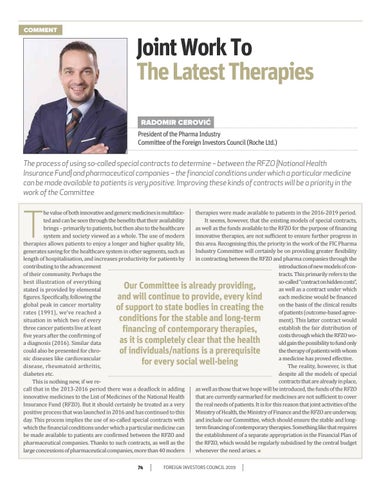COMMENT
Joint Work To The Latest Therapies RADOMIR CEROVIĆ President of the Pharma Industry Committee of the Foreign Investors Council (Roche Ltd.)
The process of using so-called special contracts to determine – between the RFZO [National Health Insurance Fund] and pharmaceutical companies – the financial conditions under which a particular medicine can be made available to patients is very positive. Improving these kinds of contracts will be a priority in the work of the Committee
T
he value of both innovative and generic medicines is multifaceted and can be seen through the benefits that their availability brings – primarily to patients, but then also to the healthcare system and society viewed as a whole. The use of modern therapies allows patients to enjoy a longer and higher quality life, generates saving for the healthcare system in other segments, such as length of hospitalisation, and increases productivity for patients by contributing to the advancement of their community. Perhaps the best illustration of everything stated is provided by elemental figures. Specifically, following the global peak in cancer mortality rates (1991), we've reached a situation in which two of every three cancer patients live at least five years after the confirming of a diagnosis (2016). Similar data could also be presented for chronic diseases like cardiovascular disease, rheumatoid arthritis, diabetes etc. This is nothing new, if we recall that in the 2013-2016 period there was a deadlock in adding innovative medicines to the List of Medicines of the National Health Insurance Fund (RFZO). But it should certainly be treated as a very positive process that was launched in 2016 and has continued to this day. This process implies the use of so-called special contracts with which the financial conditions under which a particular medicine can be made available to patients are confirmed between the RFZO and pharmaceutical companies. Thanks to such contracts, as well as the large concessions of pharmaceutical companies, more than 40 modern
therapies were made available to patients in the 2016-2019 period. It seems, however, that the existing models of special contracts, as well as the funds available to the RFZO for the purpose of financing innovative therapies, are not sufficient to ensure further progress in this area. Recognising this, the priority in the work of the FIC Pharma Industry Committee will certainly be on providing greater flexibility in contracting between the RFZO and pharma companies through the introduction of new models of contracts. This primarily refers to the so-called “contract on hidden costs”, as well as a contract under which each medicine would be financed on the basis of the clinical results of patients (outcome-based agreement). This latter contract would establish the fair distribution of costs through which the RFZO would gain the possibility to fund only the therapy of patients with whom a medicine has proved effective. The reality, however, is that despite all the models of special contracts that are already in place, as well as those that we hope will be introduced, the funds of the RFZO that are currently earmarked for medicines are not sufficient to cover the real needs of patients. It is for this reason that joint activities of the Ministry of Health, the Ministry of Finance and the RFZO are underway, and include our Committee, which should ensure the stable and longterm financing of contemporary therapies. Something like that requires the establishment of a separate appropriation in the Financial Plan of the RFZO, which would be regularly subsidised by the central budget whenever the need arises. ■
Our Committee is already providing, and will continue to provide, every kind of support to state bodies in creating the conditions for the stable and long-term financing of contemporary therapies, as it is completely clear that the health of individuals/nations is a prerequisite for every social well-being
74
FOREIGN INVESTORS COUNCIL 2019
